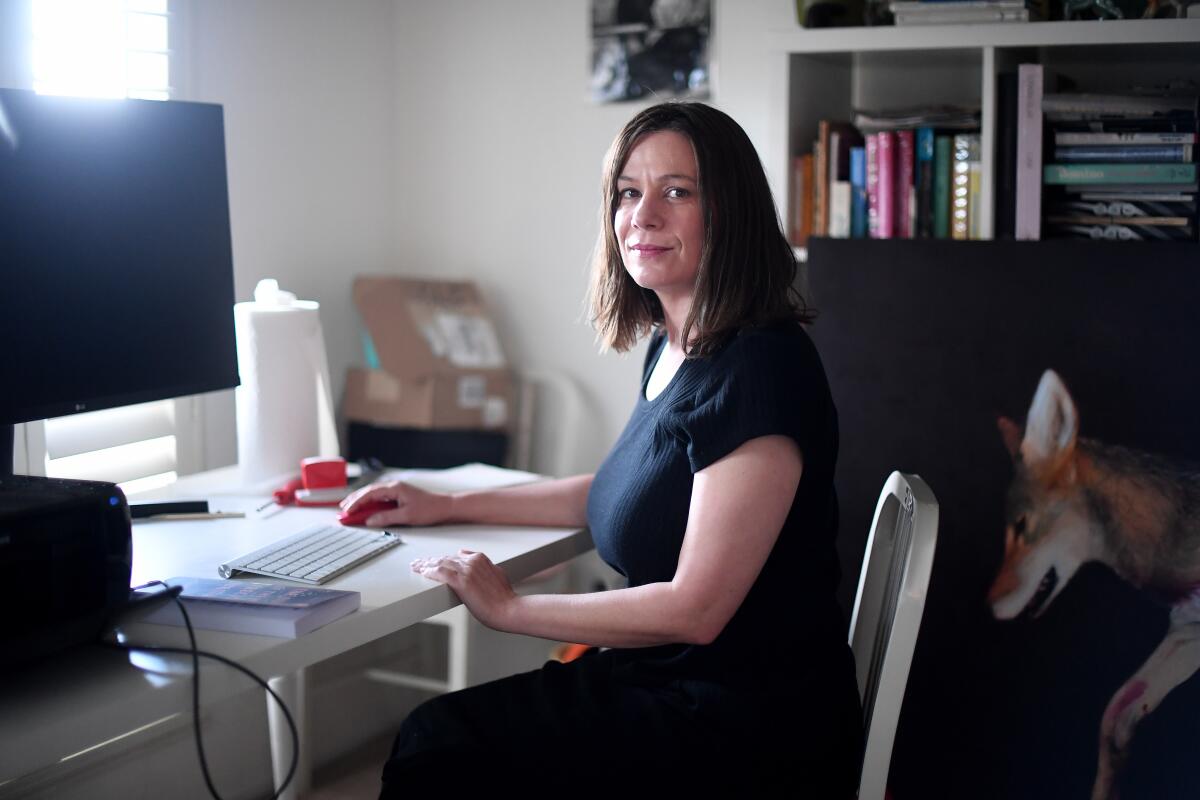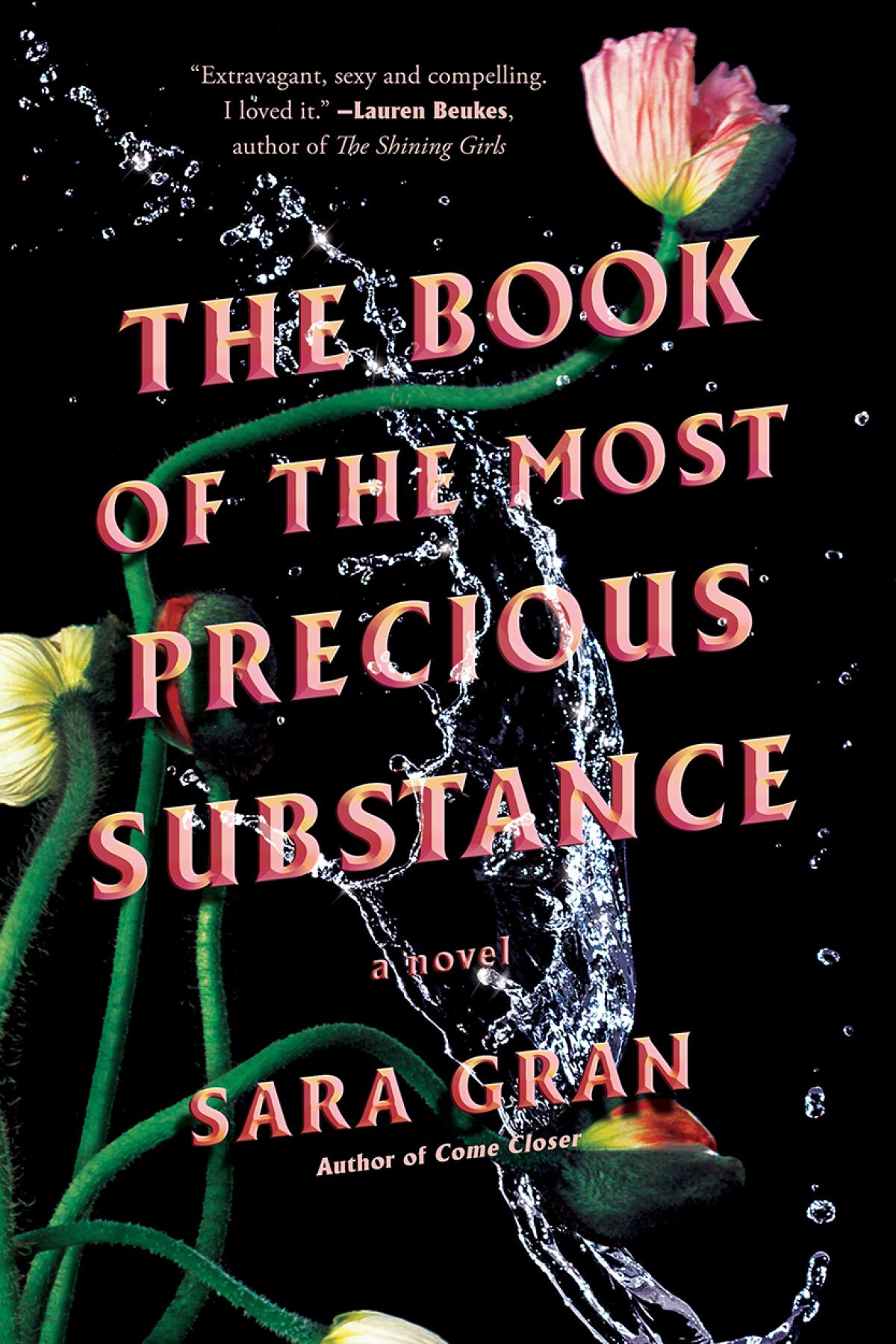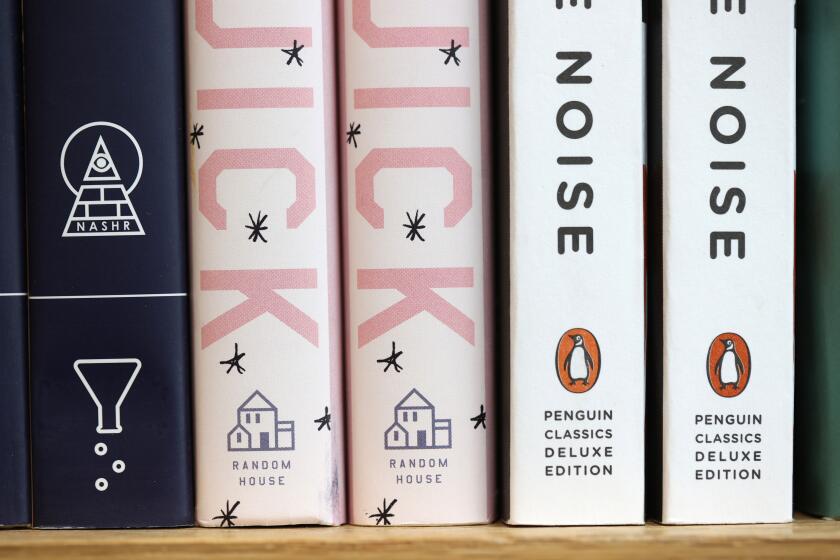Sara Gran’s new novel is about ‘the perfect book.’ She knows there’s no such thing

- Share via
On the Shelf
'The Book of the Most Precious Substance'
By Sara Gran
Dreamland: 332 pages, $19
If you buy books linked on our site, The Times may earn a commission from Bookshop.org, whose fees support independent bookstores.
Sara Gran is in a long-term relationship with books, and it’s complicated.
An ancient book of spells occupies the center of the author’s most recent novel, “The Book of the Most Precious Substance,” pulling those who seek it along a dark trajectory. The narrator, Lily Albrecht, is a rare-book dealer who becomes obsessed with finding the titular tome.
Fans of Gran’s series of novels featuring Claire DeWitt, the world’s greatest PI, will recognize echoes of “Détection,” the fictional French manual whose acolytes form a loose confederacy of crime-solvers. Their cultlike devotion to the book bonds them for better or worse.
In her new novel, Gran raises the ante by several degrees of magnitude. The book’s occult powers are real, conferring untold power on those who correctly perform its X-rated rituals. While the grimoire is a work of fiction, many of Lily’s experiences in the world of books are autobiographical.
“I never did the book fairs like Lily does,” Gran told me during a Zoom interview from her home in Marina del Rey, where she sat on the sofa with her leg in a brace after breaking her ankle on a hike. “But I worked in used and new bookstores for years. And then, when I was writing and trying to avoid having a job, I would buy books at library sales and estate sales and sell them for a couple hundred bucks.”

Although Gran never got into Lily’s rarefied world of one-of-a-kind books, she did volunteer at Housing Works in New York and at a library in New Orleans, cultivating her love of unusual books. “You never know what you’re gonna find,” Gran said, “which is the joy of working in the rare-book business. You open a box, and it could be anything.”
Perusing Gran’s oeuvre can evoke similar sensations. The author’s first three novels dabble in literary fiction (“Saturn’s Return to New York”), horror (“Come Closer”) and hard-boiled crime (“Dope”). After writing three books in the Claire DeWitt series, Gran released the haunted-house story “Marigold” as an Audible Original podcast. “The Book of the Most Precious Substance” combines elements of all these genres and hinges on a book more powerful than anything we’ve encountered in her work before.
“I don’t know where I got this idea that if you just find the right book, everything will change,” Gran said, “but it’s one of those things that I can’t shake, no matter how many times it fails to happen in real life and no matter how many times I write about it. It’s still this primary story for me, that one day, I will find a book and everything will make sense.”
What distinguishes “The Book of the Most Precious Substance” from Gran’s other novels is lots and lots of sex. The book that Lily seeks outlines a series of spells that must be completed by a pair of willing partners. As the intensity of the rituals escalates, so do the stakes for the participants — with unexpected consequences. For Gran, the choice to make sex a major aspect of the story was very intentional.
“I think, as a writer, it’s a good idea to challenge yourself and do what you haven’t done before,” she said. “I could have followed the same template and had a career writing detective novels over and over again, but that’s not what I want to do with my life. I’d always avoided writing about sex because it’s really hard to write about well. We have such a lack of good words in commonly spoken, everyday colloquial English to talk about sex.”
Nor is the sex in “Precious Substance” sprinkled around in titillating snippets; it’s intrinsic to the novel, an essential part of Lily’s character arc. Her husband suffers from a neurological disease that has robbed him of his mental and physical faculties. The requirements of round-the-clock care govern Lily’s life. The search for “The Book of the Most Precious Substance” leads Lily back to parts of herself she thought she’d given up for good.
‘It’s still this primary story for me, that one day I will find a book and everything will make sense.’
“The challenge is in getting over my own squeamishness and embarrassment about writing explicit sex for the world to read,” Gran said, “but also, how do you find the language to write these things when the only words are sort of trivial and silly? How can sex be something really meaningful and important? I wanted it to be a real part of this character waking back up to life.”
While Lily regains something of her former self, her husband continues to decline. For Gran, these two extremes of the human condition presented exciting possibilities: “What happens when someone is no longer continent? What happens when someone’s mind is no longer functioning properly? You don’t see a lot of writing about that. Some of these things are still very much swept under the rug.”

Though a strong throughline connects Gran’s work across the genres she roams — you’re always going to encounter drugs, death and uncanniness — her enthusiasm for unconventional stories hasn’t always led to good publishing experiences. Gran retains great fondness and respect for her first publisher, Soho Press, but her first publishing experience was marred by awful timing; her debut came out in September 2001.
With this latest outing, Gran, who once funded her writing with rare-book side deals, is following through on a lifelong ambition: She has started her own publishing company, Dreamland Books, and “Precious Substance” is its first guinea pig.
“Anonymous Sex” brings stories from Téa Obreht, Louise Erdrich, Mary-Louise Parker and more. Contributors on why you’ll have to guess who wrote what.
“I felt like I was going to kick myself for the rest of my life if I gave this book to Simon’s House of Random Penguins and they dropped the ball on it and it fell through the cracks and it turned into one of these s— shows,” she said. Writers are asked to shoulder so much of the burden of bringing a book to market, Gran thought, that she might as well do it herself. Unexpectedly, she started enjoying it.
“The more I worked on the book,” she said, “the less I cared if it sells. This has been such a fun experience. It’s been hard and stressful and I f— up a lot, but it’s also been really, really fun.” Her plan is to work out all the kinks with her own material and then publish two to four books a year by other writers. “I want to create a new contract that gives writers more rights in their work and more transparent accounting,” she said.
What do all these developments portend for fans of Claire DeWitt? Gran is working on the next book, but it will be a couple of years before it’s ready. “They’re really hard to write,” she admitted.
Surprising readers while delivering expected pleasures — with your own publishing company behind it — is hard work. Unfortunately, Gran doesn’t have a book of spells that grants her the power to do everything or please everyone. But she wouldn’t have invented one if not for some deep kernel of mystical belief.
“I do believe in magic to some degree,” Gran said. “I don’t think it’s a sure thing that you can count on to get what you want, but I also don’t think it’s all horse s—. I think the problem with all of this stuff, and the problem in the book, is that people are generally wrong about what they think is going to make them happy.”
The Authors Guild likes what it sees in the federal antitrust suit aiming to block the $2 billion merger of Penguin Random House and Simon & Schuster.
Ruland’s new book, “Corporate Rock Sucks: The Rise & Fall of SST Records,” will be publishing on April 12, 2022.
More to Read
Sign up for our Book Club newsletter
Get the latest news, events and more from the Los Angeles Times Book Club, and help us get L.A. reading and talking.
You may occasionally receive promotional content from the Los Angeles Times.









